Peering in through the windows of a Cantonese barbeque spot in the Richmond district, your gaze meets a line of roast duck, dripping fatty juices onto pans of stir-fried noodles, vegetables, and roast pork 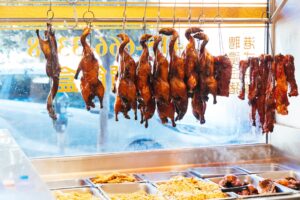 below. Next door, another restaurant dishes up steaming, juicy xiao long bao.
below. Next door, another restaurant dishes up steaming, juicy xiao long bao.
These two restaurants are where Food Bank pantry participant Ming has worked for the past 10 years – first as a cook, now as kitchen manager of both operations. Though her job has steady hours, and she’s able to eat shift meals at work, inflation is still taking a toll on her household budget: “Groceries are really expensive,” she shared. “But even though it’s hard, I still have to support my three daughters.”
That’s why her local food pantry makes all the difference.
Pantry Ingredients Save More than Money
Ming first learned about the Roosevelt Pop-up Pantry from a friend in 2020, when the pandemic shut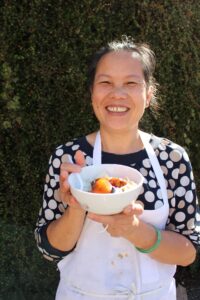 down restaurants all over the Bay Area and put her and thousands of others out of work. As a single parent raising a high schooler, putting another daughter through college, and helping support her eldest daughter at the time, Ming needed some support of her own. Ever since, these weekly groceries from the pantry near her work have remained a crucial time- and money-saver for this busy mom.
down restaurants all over the Bay Area and put her and thousands of others out of work. As a single parent raising a high schooler, putting another daughter through college, and helping support her eldest daughter at the time, Ming needed some support of her own. Ever since, these weekly groceries from the pantry near her work have remained a crucial time- and money-saver for this busy mom.
“What I get here is easily enough for a few days, sometimes a week — it depends on what there is. I’m really grateful, but I have to be strategic,” Ming told us. Thousands of neighbors are performing this mental math each week, stretching their groceries out to cover as many meals as possible.
Our survey of more than 9,000 Food Bank participants showed that single parent households like Ming’s are among those hit the hardest — 69% could not afford a $400 emergency expense, and 88% were worried about running out of food. And with the holiday season and family gatherings in full swing, the pressure to afford special ingredients on top of the essentials can be daunting.
Holidays Taste Like Mom’s Cooking
Even though year over year inflation has slowed, the cost of a holiday meal is still 13% higher compared to 2021. It’s no wonder why more than 50,000 households rely on groceries from the Food Bank as the base for their celebratory meals.
For Ming, the holidays are all about reconnecting with her three daughters — and for her family, much of that connection happens through food. She says her older daughters head home for the holidays with one thing in mind: a home-cooked meal.
“‘What tastes best is Mom’s cooking!’” Ming laughed, mimicking her daughters. “I make whatever they feel like. I make a soup with carrots, tofu, bean curd sheets, shiitake mushrooms, pork — it’s my daughters’ favorite.”
Food Brings Joy Year-Round
As the pantry is winding down for the day, Ming darts back into the restaurant and emerges with massive trays of stir-fried noodles and vegetables, braised pork, and fried rice. Food Bank staff and some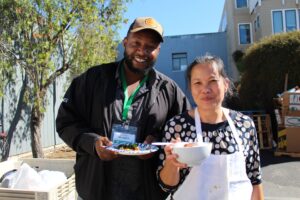 volunteers make their way over, dishing up portions buffet-style and gathering around the foldout table. Turns out, it’s not only Ming’s family that she’s bringing together over food.
volunteers make their way over, dishing up portions buffet-style and gathering around the foldout table. Turns out, it’s not only Ming’s family that she’s bringing together over food.
“I asked our chef to cook these dishes for the pantry staff – they like eating it,” she shrugged nonchalantly. “Our staff have to eat lunch too. We make enough for all of us, and then we can have lunch together.”
As folks sit around laughing, chatting and eating in the sunshine, it’s clear this lunch tradition has morphed into something beyond a quick break from work. These meals are a weekly chance to slow down, connect, and be in community with others. And whether for a special occasion or a regular Tuesday afternoon, any day is a great day to share the joy of good food.



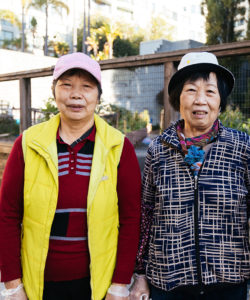
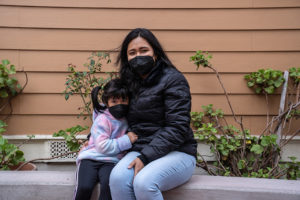 In sociology, there’s something called a “third place,” that describes a social environment outside of work or home where folks can congregate, see familiar faces, and build community. For María, the Friday food pantry in the Mission where she’s volunteered and picked up groceries for the past 10 years is a little of all the above.
In sociology, there’s something called a “third place,” that describes a social environment outside of work or home where folks can congregate, see familiar faces, and build community. For María, the Friday food pantry in the Mission where she’s volunteered and picked up groceries for the past 10 years is a little of all the above.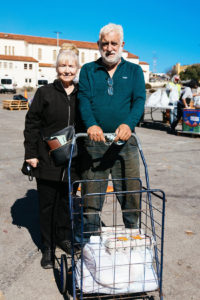
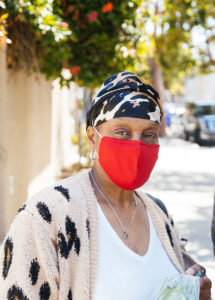 Sharing Space, Creating Memories
Sharing Space, Creating Memories 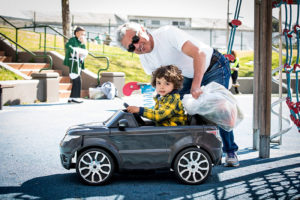 Other parents are more hesitant to let go of remote or homeschooling. Farzad is the single dad of 3-year-old Mehdi, as well as a musician, small business-owner, and participant at Cesar Chavez Pop-up Pantry. Farzad watches his son drive a toy car around the playground and sighs, shaking his head when asked about in-person preschool. He doesn’t “want Mehdi to go until COVID is over,” citing health concerns like maskless and unvaccinated children.
Other parents are more hesitant to let go of remote or homeschooling. Farzad is the single dad of 3-year-old Mehdi, as well as a musician, small business-owner, and participant at Cesar Chavez Pop-up Pantry. Farzad watches his son drive a toy car around the playground and sighs, shaking his head when asked about in-person preschool. He doesn’t “want Mehdi to go until COVID is over,” citing health concerns like maskless and unvaccinated children. 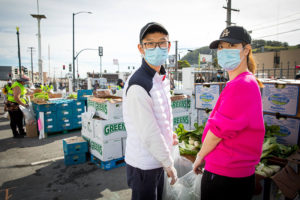 Wei Zong join other participant-volunteers in providing healthy groceries to their neighbors while also receiving food assistance themselves. For Jiakuang and his family, Thursday mornings at Cornerstone have been a time not only to receive and distribute food, but to mingle, talk, and laugh with other volunteers and food bankers.
Wei Zong join other participant-volunteers in providing healthy groceries to their neighbors while also receiving food assistance themselves. For Jiakuang and his family, Thursday mornings at Cornerstone have been a time not only to receive and distribute food, but to mingle, talk, and laugh with other volunteers and food bankers.
Share